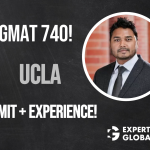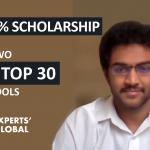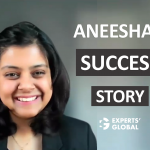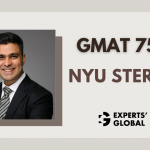Verbatim
Experts’ Global: Hi Shibashish! Thank you so much for taking out time to interview with us. May we request you to please share your journey and your story in your own words?
Shibashish: Absolutely! Thank you for having me; happy to help in any way I can. I will start off with my undergraduate days. I did my electrical engineering at IIT Kharagpur and graduated in 2015, after which I decided to join a Consumer-Packaged Goods company, ITC Limited. I worked there for five years, primarily in project management and operations. As I worked there, I got curious about other industries and wished to broadly impact them as well.
Accordingly, I decided to target a job in consulting. The best path to a consulting role for me lay through an MBA because it helps you build a certain kind of network and also imbues you with decision-making frameworks that are helpful when dealing with ambiguous situations. Thus, I decided to pursue the MBA route and work with an MBA Admissions Consultant.
I chose Yale primarily because the class size at Yale, compared to other universities, is slightly smaller. I thought that, given the cohort environment and everything, having a smaller student group would be more helpful as it increases the cohesion between team members. Other than that, Yale also has a really good network and a challenging group of students each year. Overall, it has been a fantastic experience!
Experts’ Global: In your opinion, what are a few factors or actions you took that made all the difference?
Shibashish: Primarily, two things helped me in my process, from GMAT preparation to finally getting the offer. The first thing was reaching out to students currently studying in those universities. This is because, while online research might uncover some nuanced information about a particular university, the information that you see on school websites might seem a bit generic. Thus, the best research option is to reach out to people. By doing so, I got to know about several programs and activities at Yale that convinced me further about applying to the school!
The second thing I would say is to take help from an MBA admissions consultant such as Experts’ Global (EG) because, initially, there is so much you do not know about what recruiters are looking for. If you try to find out all of that by yourself, you would be using a lot of time. Also, you lack the necessary experience because that is the first application you are working on! On the other hand, the consultants at EG have done that multiple times, and know which frameworks to apply. I would say these are the two primary things that have helped me in my process.
Experts’ Global: With the benefit of hindsight, what are a few mistakes you believe you committed in the process?
Shibashish: Sure! I think there were two primary mistakes that I made during the application process. The first mistake was not spacing out my GMAT preparation and application. I remember that, at some point in the process, I was preparing for the GMAT and working on my application simultaneously. I would seriously recommend people first get their GMAT out of the way. Take a free GMAT mock to see where you stand, have a minimum acceptable score and try to reach that, and once you achieve it, just keep it behind you. You are done with your GMAT and can now completely focus on your application.
The second thing, of course, would be to time the entire sequence. The best thing to do is to calculate backward from your application date. I would say keep a comfortable one and a half, maybe two, months for your application because it does take time. If you are from an engineering background, as I am, language might not be your strong suit, which means that there are going to be several revisions along the way. Thus, keep a good two months in hand for the applications and then proceed with your GMAT preparation. I would say these are the two mistakes that I made, and avoiding these would be my advice to anyone who is planning to apply.
Experts’ Global: It takes a lot of courage to accept one’s mistakes and then learn from them. Likewise, what would you like to say about your experience and learning from managing the application timeline?
Shibashish: I think there are two key things that are important when it comes to managing the application timeline. The first is, of course, the selection of schools, because you do not want to bite off more than you can chew. Getting the school selection right is vital because each individual application is almost like a project in itself.
The second thing would be being organized in your approach. When I first approached Experts’ Global, I wanted to apply to 10 to 15 schools, just to hedge my bets. I had a very useful conversation with Aanchal, who told me that it is always better to apply to fewer schools, with a mix of really good schools and safe bets alike. Since Experts’ Global has done these applications so many times for so many students, they have a good idea of what is realistic and what is ambitious as per one’s profile. It was really helpful to get a good shortlist of schools that I could apply to.
Here, again, the outreach to students will be really helpful because you might be surprised by the responses. Some universities, which might not occur on your initial list, might turn out to be suitable for your profile or your needs.
Another good thing about Experts’ Global is that they have a complete planner to keep one’s application progress in check. The deadlines for different milestones within the planner keep things moving along quick while also allowing flexibility when needed. Following the steps in the planner made everything much less complicated for me.
Overall, these were the key factors for me while juggling all the applications.
Experts’ Global: Can you tell us more about your interview experience with the business school?
Shibashish: Sure! When you’re doing your applications, you kind of get an idea of what’s going to be asked in the interviews. They are primarily going to be behavioral-based questions. I was never surprised when I went into an interview, largely because of the application questions and the MBA interview prep at Experts’ Global. I was, thus, already familiar with the interview structure.
In terms of the interview experience, one thing in hindsight that I would say is really important, at least it was for Yale, is time management. In interviews, it is possible that one goes into detail during a particular answer and makes one’s response very long. However, something that people have to keep in mind is that the person taking your interview has limited time.
You also need to reach the point where you are the one who is asking questions. It should not be the case that the interviewer just asked one or two questions and time ran out. Being concise and precise is also important in certain places. The best way to do so is just to have repetition in terms of your practice because there will be some standard questions that might crop up. If you have already prepared for such standard questions, your interview will go all the more smoothly.
Experts’ Global: Would you like to share more details about your MBA experience so far?
Shibashish: One of the key things about the MBA experience is that it is a professional degree, unlike an engineering degree. This means that the people with whom you would be studying and working shall play a very important role in the overall MBA experience. In that way, it has been really great. The class that I was put into had so much diversity when it came to the backgrounds of people, and the kinds of experiences they have had.
The entire curriculum is designed around a teamwork-based approach. You will be put in teams where you have very clear deliverables and you will be made to understand how to manage the team dynamics. For me, it was a learning curve because I was not used to the nuances of American work culture. The MBA experience helped me really understand this aspect.
Further, I would say there are several industries in the US that are much more mature compared to those in India. When you are studying in the US, you get good exposure to these more matured industries, which I think is a very critical point of an MBA. There are so many industries that you might come across that you had no clue about earlier. For instance, I had an opportunity to work in an electric vehicle company, which would have been really difficult, if I was in India.
You gain a lot of exposure, and I think Yale does a really good job of making sure that you do get it. Other than that, the fundamental blocks that you’ll see in any business school are also here. You have the professional clubs and interest clubs, in terms of activities. It has been a fantastic experience for me personally.
Experts’ Global: Would you like to tell us more about your job search experience during the MBA? And what tips will you give to the future candidates?
Shibashish: Personally, I interned at Tesla, after which I wished to move into consulting. I will be entering the consulting space soon as the school has just wrapped up our full-time recruitment. The recruitment process, in general, is very different from what we are used to. Back in India, around December mostly, one has companies coming in to hire from campuses. There is no such system here. Further, the habit of conducting outreach becomes really useful for the job search. Recruiters here value people who take the effort to actually understand more about the job. It’s more of a networking-driven system rather than a mechanical, submit-one’s-resume-and-wait system.
You spend a considerable amount of time just on research, reaching out, and trying to understand better what a consulting role entails, activities in which the student clubs and the entire student body will prove useful. At Yale, for example, it’s a very collaborative process. You will never feel that you are actually competing with anyone else because everyone is helping each other. That is one of the critical things that I believe will be useful for anyone looking for a good business school experience.
When it comes to what one expects, what will happen in a particular role, what would be the skillset required, and what myths need to be cleared, all is taken care of by the student body. It is up to you to take advantage of these resources and reach out to the individual organizations to understand better the role.
Help is also at hand once you have an invite for the actual interview process. When it comes to the interview process prep and the application prep, schools often already have rigorous protocols in place. Let’s say if you want to get into any one of the tech companies, there is an excellent tech club at Yale with great leaders. They’ll make sure that you imbibe the necessary skillset and familiarize yourself with the possible questions.
Overall, it is really a good environment. For anything that you would need to prepare for your interviews, there are resources available. You just have to reach out and take advantage of them! Often, people notice you at events or gatherings and reach out themselves.
Experts’ Global: How then do you think the entire pre-application phase has contributed to your growth?
Shibashish: When I specifically talk about the application phase, the entire process made me much more comfortable regarding peer-on-peer research. Making the effort for outreach comes easier to me now. If you, let’s say, do go into the interviews, then it is really helpful to know all of this stuff because it shows that you’ve done the research. This also makes your case and responses more convincing instead of leaving you with a generic answer about your motivations. The outreach exercise, which I did during the process, was definitely helpful. It primed me for the entire recruitment process and for being more disciplined when it comes to different kinds of applications.
The other thing I would say about the application process is that it will give you good insights into how American work culture is, and the things that a recruiter is looking for in your application. Those aspects will be repeated when you actually apply for jobs, and since you have these insights from the application phase, they are really helpful later on. This is a factor in the applications phase that helped me in the final recruiting process.
When it comes to the university itself, I think the first thing is the academic aspect of things. Working with other people, you just become more capable of tackling different kinds of problems. You are much more ready, basically. You have an expanded arsenal of tools at hand. The second thing is the network of students. Your peers themselves will be really good resources, and will help you navigate the different industries and the things you can expect within them.
The final thing is additional resources such as the professional club or the student clubs which will make sure you never walk into a particular industry completely blind. You will have first-person accounts from people who have actually worked in those industries! They will be able to tell you what you can expect and the skillsets required.
I would say that the combined effect of the application journey and the business school itself can give you a lot of things to draw from when it comes to the recruitment process.
Experts’ Global: According to you, what are a few common mistakes that all GMAT aspirants and MBA applicants must avoid?
Shibashish: I think the first error that I see people doing is prepping for GMAT and completing their application parallelly. It is a sequential process; it does not have to go parallel. In fact, it is counterproductive if you do it the latter way because you are not left with much time to take enough GMAT practice tests.
The second thing that I would say is that when it comes to writing essays, people often do not actually know what the recruiter or what the AdCom is actually looking for. As a result, the essay one writes and one’s resume do not make sense when they are put together! Your resume might depict shifts from one industry to another and your essay might portray another, unrealistic shift. This mismatch happens much more frequently than we would like to admit. To me, the reason is psychological. When you are writing your essay, you are in a different mindset, and when you are writing a resume, you are in a different mindset.
Lastly, I would say that not doing outreach is a big mistake that I’ve seen people commit. People should rectify the situation if they have not done a single reach out to school alumni or current students because that might hurt them in the interview process. In the interview, they might ask you very specific and it always helps if you’ve done some sort of research.
In my case, a student told me that there is a particular kind of practical course that puts you on real-life projects with different companies. Now, this is something very difficult to find on the website, but it is a piece of very useful information that shows that the MBA is not merely theoretical, and that it involves hands-on work too.
My research into the practical aspects of the MBA made me much more convinced about my application and also helped me in the interview process. I talked about what I specifically liked about the school, and the courses that made sense vis-a-vis my lack of a consulting background. I was able to make the case that it would be good for me to put my skills to the test in the practical module before I started my job! So, those are the things to watch out for in the application process.
Experts’ Global: What would be your final message to all MBA aspirants?
Shibashish: If you’re planning to take up this challenge of applying to a business school, the first thing to remember is to always relax and be calm. It is a sequential process, and more a marathon than a sprint. Make sure you are organized, map out and execute your application strategy well, and definitely take help from professionals. I was fortunate that I had Experts’ Global to help me out. As I mentioned earlier, my mismanagement of time meant that I had little breathing room on my applications, and would have been unable to complete them without EG’s help.
Everything good is going to happen if you just stay organized and keep proceeding. As for what we have discussed here, I think all’s well that ends well!
Experts’ Global: Thank you so much for sharing your story with us. We look forward to knowing more about your success stories in the near future as well. All the very best and thank you for giving us your time!
Shibashish: Happy to be here and happy to help. Thank you as well!







